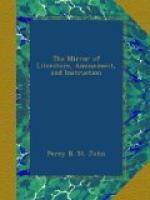The bishop says he wrought much with his own hands, and made all about him work at the models of ships. Who he had with him, besides Menzikoff and Golownin, does not anywhere appear, but the Postman[12] of the 29th March says, “The Tzar of Muscovy is returned from Portsmouth to Deptford, where his second ambassador is arrived from Holland.” The two principal Russian workmen in Holland, of rank, were Menzikoff and the Prince Siberski, the latter of whom is said to have been able to rig a ship from top to bottom. The object in remaining at Deptford would appear to have been, as before stated, chiefly to gain instruction how to lay off the lines of ships, and cut out the moulds; though it is said, on the testimony of an old man, a workman of Deptford yard some forty years ago, that he had heard his father[13] say, the Tzar of Muscovy worked with his own hands as hard as any man in the yard. If so, it could only have been for a very short time, and probably for no other purpose than to show the builders, that he knew how to handle the adze as well as themselves.
[12] No. 442.
[13] Mr. James Sibbon, who was
a journeyman shipwright in
Deptford yard when the Tzar was there; he
died in 1769,
aged 105 years.—Annual Register
for 1769.
When residing at Deptford he requested to see the celebrated Dr. Halley, to whom he communicated his plans of building a fleet, and in general of introducing the arts and sciences into his country, and asked his opinion and advice on various subjects; the doctor spoke German fluently, and the Tzar was so much pleased with the philosopher’s conversation and remarks, that he had him frequently to dine with him; and in his company he visited the Royal Observatory in Greenwich Park.
As in Amsterdam, so also in London, he visited the manufactories and workshops of various artificers, and purchased whatever he deemed either curious or useful; and among other things “he bought the famous geographical clock made by Mr. John Carte, watchmaker, at the sign of the Dial and Crown, near Essex-street in the Strand, which clock tells what o’clock it is in any part of the world, whether it is day or night, the sun’s rising and setting throughout the year, its entrance into the signs of the zodiac; the arch which they and the sun in them makes above or below the horizon, with several other curious motions."[14] He was very curious in examining the mechanism of a watch, and it is said he could take one of these ingenious machines to pieces, and put it together again, before he left London.
[14] Postman, No. 136.
The king had promised Peter that there should be no impediment in his way of engaging, and taking with him to Russia, such English artificers, and scientific men, as he might desire, with such instruments as their trade or profession required.




